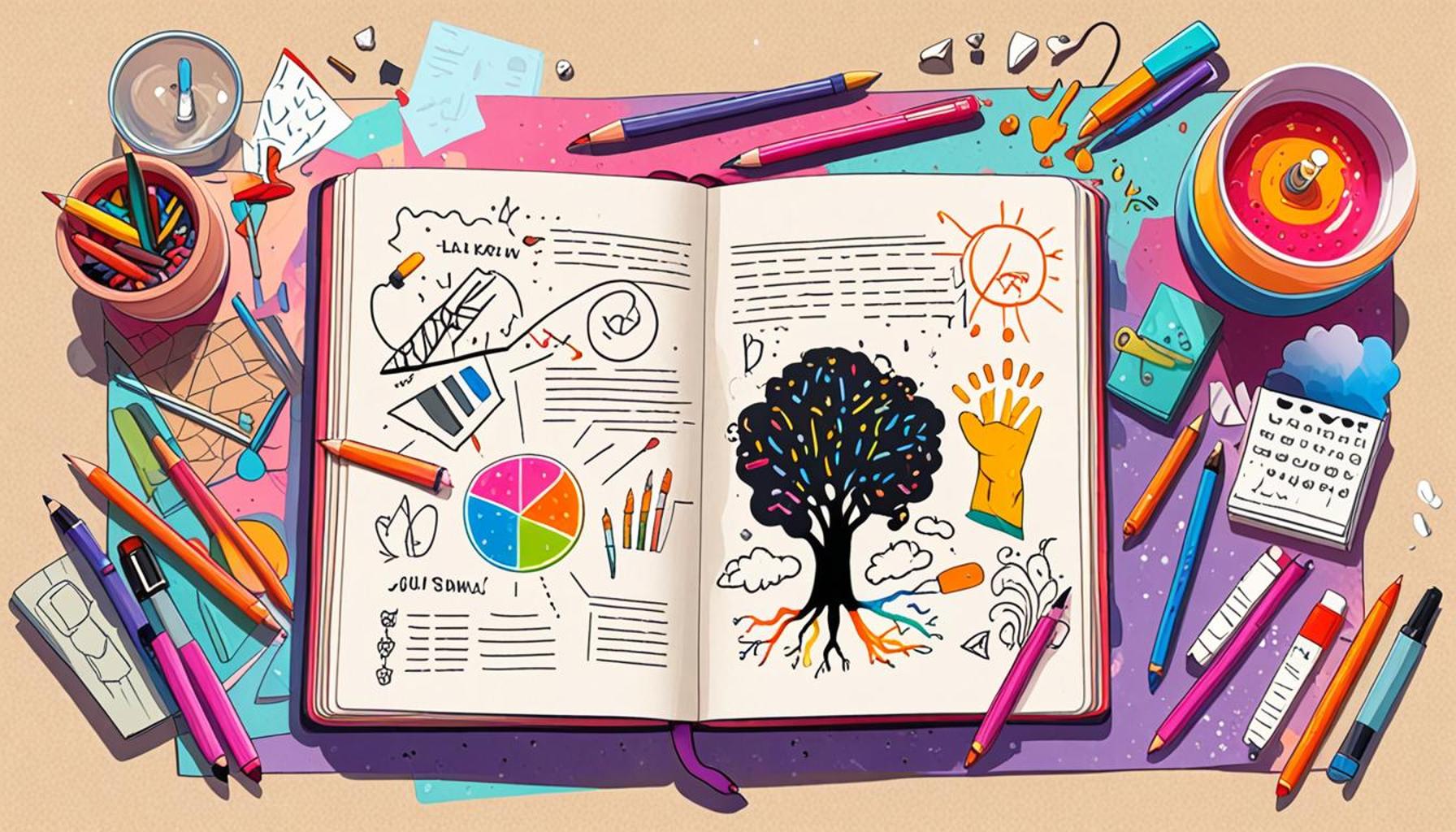Empower Nigerian Students Growth Mindset Through Reflective Journaling

Empowering the Next Generation
In an ever-evolving world, nurturing a strong growth mindset among students is paramount to their success. This approach, characterized by an openness to learning and resilience in the face of challenges, is particularly vital for Nigerian students who navigate a dynamic educational landscape. One powerful tool that can facilitate this development is the reflective journal.
Why Reflective Journaling Matters
Reflective journaling encourages students to engage in deeper self-analysis and personal growth. This technique fosters critical thinking and enhances emotional intelligence, equipping students with the skills needed to thrive. Key benefits include:
- Improved Self-Awareness: Journals help students identify their strengths and weaknesses.
- Enhanced Problem-Solving Skills: Reflecting on challenges leads to innovative solutions.
- Increased Motivation: Documenting progress encourages a sense of achievement.
As we delve into the Top 5 ways that reflective journaling can promote a growth mindset among Nigerian students, this article will uncover practical techniques and insights to inspire educators, parents, and students alike. Join us on this journey to unlock potential and foster resilience in the classroom.
ADDITIONAL INSIGHTS: Expand your understanding here
Top 5 Reasons Why Reflective Journaling is Crucial for Developing a Growth Mindset in Nigerian Students
In today’s lightning-paced educational landscape, the concept of a growth mindset is transforming the way Nigerian students engage with learning and overcome challenges. Introduced by psychologist Carol Dweck, a growth mindset is the belief that abilities and intelligence can be developed through dedication and hard work. This revolutionary concept challenges traditional notions of fixed intelligence, providing students with a dynamic approach to learning. One particularly effective strategy for cultivating a growth mindset is reflective journaling. This seemingly simple practice can lead to profound changes in students’ attitudes and abilities, making it an indispensable tool in modern education. Let’s delve into the top five reasons reflective journaling is vital for promoting a growth mindset among Nigerian students.

5. Encouraging Self-Discovery
Reflective journaling offers students a private realm where they can freely express and analyze their thoughts, feelings, and experiences. In a world often defined by external expectations, journaling is a sacred space for introspection. Students can chart their academic progress, confront their struggles, and spotlight their successes. This self-discovery is crucial: when students learn to identify their unique learning styles, strengths, and areas for improvement, they can transform challenges into opportunities for growth.
Consider the case of a student who initially struggles with mathematics but, through journaling, recognizes a passion for problem-solving. This realization can lead to a deeper engagement with the subject, turning what was once a source of frustration into a realm of potential mastery. By documenting continuous progress, students build a stronger sense of self-awareness, which paves the way for developing a growth mindset.
4. Enhancing Critical Thinking Skills
Critical thinking is an essential skill in both academia and the broader world. Unlike simple note-taking, reflective journaling requires students to actively engage with their experiences, questions, and presumptions. Rather than merely stating events, students dissect their reactions, explore alternate perspectives, and challenge preconceived notions.
For instance, instead of merely acknowledging a failed exam, a student might reflect, “What study techniques did I use? How can I alter my approach for better results?” This level of analysis not only fosters a growth mindset but also equips students with the tools to adapt and thrive in diverse situations. As Nigerian students face increasingly complex global challenges, honing these critical thinking skills through journaling becomes even more imperative.
3. Fostering Goal Setting and Achieving Mindset
Reflective journaling is a powerful mechanism for setting and achieving meaningful goals. By articulating goals in writing, students clarify their ambitions and formulate concrete plans to reach them. The act of writing transforms abstract ideas into actionable objectives, which can lead to significant leaps in personal and academic achievement.
Journaling provides a continual record of progress, acting as both a roadmap and a retrospective. This dual function is particularly impactful as students learn to navigate the complexities of goal setting. They not only set goals but also develop resilience through celebrating small milestones and reassessing strategies, enhancing their motivation and self-efficacy.
Research supports the efficacy of this approach. Studies indicate that individuals who regularly reflect on their goals and progress are more likely to achieve positive outcomes. Therefore, by engaging in reflective journaling, Nigerian students are empowered to take ownership of their educational and personal growth journey.
2. Building Emotional Intelligence
In the intricate social fabric of Nigeria’s diverse educational institutions, emotional intelligence becomes a crucial attribute for success. Reflective journaling allows students to process and articulate their emotions, fostering emotional awareness and regulation.
By delving into their emotional responses to various situations, students develop the empathy and understanding necessary for effective communication and collaboration. This emotional insight mitigates the stress and anxiety often associated with academic pressures, thereby fostering more resilient and well-rounded individuals.
As Nigerian students become increasingly engaged in complex social dynamics, from classroom group projects to broader communal interactions, the ability to navigate emotions adaptively strengthens their interpersonal skills. Reflective journaling, therefore, not only enhances academic performance but also prepares students for life beyond the classroom.
1. Instilling a Positive Attitude Towards Learning
At the heart of a growth mindset is the conviction that continual effort leads to development. Reflective journaling nurtures this belief by encouraging students to reflect on challenges and their corresponding triumphs, fostering a positive perspective on learning.
Students learn to perceive setbacks not as failures but as invaluable learning opportunities. For example, a student who struggles with public speaking might document their journey of preparing for a school presentation, reflecting on each attempt and its outcomes. Over time, this practice not only improves their skills but also builds confidence, instilling a lifelong love of learning.
By acknowledging progress and articulating learning experiences, students gain a broader understanding of their capabilities. This resilient outlook not only contributes to academic success but also equips students with the mental frameworks needed to tackle future challenges with optimism and determination.
In conclusion, reflective journaling emerges as a vital practice for cultivating a growth mindset in Nigerian students. Through self-discovery, cultivation of critical thinking, strategic goal setting, development of emotional intelligence, and fostering a positive learning attitude, students are better equipped to navigate the ever-evolving landscapes of education and life. As they embrace reflective journaling, these students are likely to discover not just academic success, but also personal fulfillment that transcends their studies.
The use of reflective diaries is gaining significant traction in educational settings as a tool for fostering a growth mindset among Nigerian students. This technique encourages deep self-reflection, enabling learners to evaluate their experiences and thought processes critically. Such a practice not only enhances emotional intelligence but also equips students with essential skills for lifelong learning. Reflective diaries serve as a personal space for students to document their thoughts, aspirations, challenges, and progress, promoting self-awareness and resilience.Implementing reflective writing in Nigerian classrooms can bridge the gap in educational approaches, transforming how students perceive their capabilities and learning outcomes. These diaries often act as catalysts for self-improvement, encouraging students to view challenges as opportunities to grow rather than insurmountable obstacles. For instance, when facing a difficult subject, students are prompted to analyze their mindset and adapt their strategies, cultivating a persistent attitude that characterizes successful learners.Moreover, the process of regularly revisiting their thoughts and experiences permits students to identify recurring themes and patterns in their learning behaviors. This recognition can pave the way for effective goal-setting and more structured approaches to studying. By nurturing the habit of reflective writing, educators can facilitate a pattern of growth where students actively seek feedback and embrace constructive criticism, leading to better academic performance and personal development.In addition, the reflective diary is not merely a routine task; it can foster a richer classroom dialogue. When students share insights from their diaries, they develop a sense of community and collaboration. This practice reinforces the idea that learning is a shared journey, enhancing peer relationships and fostering an environment of mutual support. Educators can harness these discussions to tailor their teaching methods, addressing the diverse needs of their students while simultaneously promoting a culture of open communication.Quantitatively, studies suggest that students who engage in reflective practices demonstrate improved academic outcomes. By integrating reflective diaries into the curriculum, there exists the potential for achieving higher engagement levels and enhancing critical thinking skills. The benefits extend beyond academic performance, as students learn to manage stress and develop coping strategies that are vital in their personal and professional lives.Ultimately, the implementation of reflective diaries in Nigerian education can transform the landscape of learning. As students harness the power of self-reflection, they cultivate a growth mindset that encourages them to embrace challenges and foster a love for learning, positioning them for success in an increasingly complex world. Engaging in this practice practicalizes the principles of growth mindset theory while aligning with the educational goals of fostering innovative and adaptable leaders of tomorrow.
CHECK OUT: Click here to explore more
Frequently Asked Questions
What is a reflective journal, and how does it benefit Nigerian students?
A reflective journal is a personal diary where students document their thoughts, experiences, and learning processes. For Nigerian students, maintaining such a journal can significantly aid in developing a growth mindset. This practice encourages them to reflect on their learning journey, recognize areas for improvement, and celebrate their achievements. In turn, it fosters self-awareness, critical thinking, and adaptability—all essential skills in today’s rapidly changing educational landscape.
How can a growth mindset impact the educational experience of students?
A growth mindset, the belief that abilities can be developed through dedication and hard work, can have a profound impact on the academic life of students. It encourages them to view challenges as opportunities for growth, rather than insurmountable obstacles. In the context of Nigerian education, where students often face resource constraints, a growth mindset can equip them with resilience and persistence, helping them to navigate difficulties and persist towards achieving academic success.
Are there specific strategies for effectively integrating reflective journals in the Nigerian educational system?
Yes, there are several strategies to successfully integrate reflective journals into the education system. Teachers can incorporate prompts related to daily lessons or encourage students to set personal learning goals at the beginning of the term. It is also vital for educators to provide regular feedback and create a supportive environment where students feel comfortable sharing their reflections. Additionally, pairing journal entries with digital platforms can foster online collaboration and allow for a broader exchange of ideas.
What challenges might educators face when implementing reflective journals in Nigeria, and how can they be addressed?
One of the primary challenges educators might face is the limited access to resources, such as paper and internet connectivity. To mitigate this, schools can consider digital solutions that require less material, like keeping journals on accessible mobile devices or computers. Additionally, there might be an initial resistance from students who are not accustomed to self-reflection. Educators can overcome this by incorporating engaging and relevant content that speaks to students’ experiences and interests, gradually encouraging them to embrace reflective practices.
How can parents support their children in maintaining a reflective journal?
Parents play a crucial role in fostering a growth mindset at home. They can support their children by encouraging regular journaling, expressing interest in their entries, and discussing the reflections during family conversations. It is also beneficial for parents to model reflective behavior themselves, demonstrating its value and application in everyday life. Through these actions, parents can help create a positive feedback loop, where students feel supported and motivated to continue their reflective journey.
SEE ALSO: Click here to read another article
Conclusion
In today’s rapidly changing educational landscape, fostering a growth mindset is crucial for the success of students, particularly in countries like Nigeria where educational challenges are prevalent. The use of reflective journaling as a tool to develop such a mindset in Nigerian students presents numerous benefits and opportunities.
Our exploration into this topic highlights several key takeaways. First, reflective journaling empowers students by encouraging them to process their experiences, venturing beyond the retention of factual knowledge. By fostering self-awareness and promoting critical thinking, students are more apt to embrace a perspective of continual growth and learning. Second, the practice of maintaining a reflective journal can cultivate resilience and perseverance, as students become more adept at identifying challenges and strategizing solutions independently. Additionally, the introspective nature of journaling nurtures creative thinking and problem-solving abilities, equipping learners with skills that transcend academic performance.
Moreover, integrating reflective journaling into the educational framework necessitates support and engagement from educators, who must be committed to guiding students on this reflective journey. By doing so, they can help unlock each student’s potential, transforming setbacks into opportunities for growth and development.
In essence, while the path to achieving a growth mindset through reflective journaling requires dedication and an open-minded approach, the long-term gains for Nigerian students and the broader educational system are undeniably significant. As stakeholders in education, it is incumbent upon us to explore and incorporate innovative methods such as reflective journaling to prepare students not only for academic triumphs but for lifelong success.


